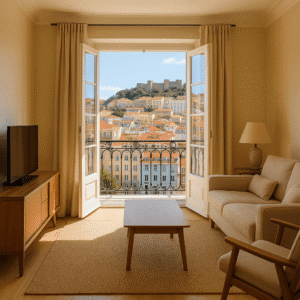
Comprehensive Guide for Moving to Portugal from the Philippines
Are you thinking about making a big change in your life? If you’re considering moving to Portugal from the Philippines, you’re about to embark on an exciting adventure! Portugal is a beautiful country known for its rich culture, stunning landscapes, and a lifestyle that’s both relaxed and fulfilling. In this guide, we’ll walk you through everything you need to know about making the move, including visa options, the application process, and what life in your new home will be like.
The Appeal of Relocating from the Philippines
Why choose Portugal? Imagine trading the fast pace of life in the Philippines for the sun-drenched streets of Lisbon or the serene beaches of the Algarve. With its warm Mediterranean climate, friendly locals, and delicious food, Portugal is becoming a popular choice for many people immigrating to Portugal from the Philippines.
Whether you’re looking to retire, start a new career, or simply enjoy a change of scenery, Portugal offers a high quality of life and plenty of opportunities. From picturesque landscapes to its rich history, you’ll find a little bit of everything here. Plus, the cost of living in Portugal can be quite competitive compared to other European countries, which can be a significant advantage when considering a move from the Philippines.
The Benefits of Life in Portugal
When you imagine relocating to Portugal from the Philippines, think about a life full of vibrant culture, stunning views, and a slower pace that lets you truly savor every moment. Portugal is not just a beautiful country; it’s also safe, with a strong healthcare system and generally lower living costs compared to many other European nations.
Picture yourself exploring charming towns on weekends, relaxing on breathtaking beaches, and enjoying mouth-watering cuisine. Portugal offers some of the best wines and fresh seafood, making every meal feel like a special treat. The friendly Portuguese people are known for their warm hospitality, making it easier for newcomers to feel at home.
Preparing for Your Move: Key Steps for Philippines
Making the decision to immigrate to Portugal from the Philippines is a big step, and proper preparation will make the process much easier. From visa applications to shipping logistics, a well-thought-out plan can help avoid last-minute surprises. Here’s a guide to help you get ready:
Creating a Relocation Plan
Start with a detailed checklist to track everything from gathering visa documents to finding temporary accommodation upon arrival. Think about how you’ll move your belongings, the best time of year for your move, and how you’ll manage expenses during the transition. A solid plan will help keep you on track and reduce stress.
Choosing the Best Time for Immigrating to Portugal from the Philippines
If you’re wondering when to make the transition, spring and fall are ideal seasons to move to Portugal. During these times, the weather is mild, making it easier to settle in. Additionally, there is less competition for housing, which can make finding accommodation simpler and more affordable.
Selecting a Region in Portugal
When you’re planning immigration to Portugal from the Philippines, choosing the right region to settle in is crucial. Portugal offers diverse living environments, from bustling cities to serene coastal towns. Each area has its own charm, so consider what aligns best with your lifestyle and needs. Here’s a look at some popular choices:
Key Regions: Lisbon, Porto, and Algarve
- Lisbon: As Portugal’s capital, Lisbon offers a rich mix of history, culture, and modern amenities. It’s a city full of life, making it an excellent choice for young professionals looking for career opportunities and a vibrant social scene. The job market is particularly strong in sectors like tech, tourism, and education.
- Porto: Located in northern Portugal, Porto is famous for its picturesque riverside views and historic architecture. It provides a blend of tradition and modernity, making it ideal for those who enjoy a slower pace without sacrificing urban conveniences. Porto’s rich cultural scene and welcoming atmosphere make it a great place to settle for newcomers.
- Algarve: Known for its beautiful beaches, warm climate, and laid-back lifestyle, the Algarve is particularly appealing to retirees and families seeking a coastal way of life. With its sunny weather and vibrant expat community, the Algarve offers a more tranquil living environment by the ocean.
Urban vs. Rural Living
Deciding between urban and rural living is a major factor in a successful immigration to Portugal from the Philippines. Cities like Lisbon and Porto are bustling with activities and opportunities, but they also come with higher living costs. Rural areas and regions like the Algarve provide a peaceful environment with beautiful natural scenery and lower living expenses. Consider what lifestyle suits you best, whether it’s the dynamic pace of city life or the calm of the countryside.
Selecting the right place to live in Portugal can greatly impact your experience. Whether you’re drawn to the cultural richness of Lisbon, the charm of Porto, or the relaxed vibe of the Algarve, each location has something unique to offer. Move to Cascais can provide personalized guidance to help you find the perfect place to settle as you start your new life in Portugal.
Portugal Visa from the Philippines: Your Pathway to Immigration
Before you can start your new life in Portugal, you need to navigate the Portugal visa requirements from the Philippines. The visa process can seem complicated, but don’t worry—we’ll break it down for you!
There are various visa options available, including the Student Visa, Family Reunification Visa, and more. Whether you’re moving for work, study, or to join family, Portugal offers different options to make the transition smoother. You can find a complete list on our articles page. Here are some of the most popular visa options for those considering immigration to Portugal from the Philippines:
D7 Passive Income Visa
This visa is designed for individuals with a steady income from sources outside Portugal, making it ideal for retirees or those with rental income. To qualify, you’ll need to show proof of your income, secure health insurance, and provide a clean criminal record.
The D7 Visa is an excellent choice for Filipinos who want to move to Portugal without needing to work locally. Whether you’re receiving a pension, living off investments, or have other forms of stable passive income, this visa allows you to live comfortably in Portugal. If you’re considering a Portugal visa from the Philippines, the D7 Visa is known for its relatively straightforward application process. Our team at Move to Cascais is here to help make the process even smoother. Visit our website for detailed guidance on the D7 Visa, where we’ll walk you through all the essential steps for a successful application.
D2 Visa: Portugal Visa for Philippines Citizens
The D2 Visa, commonly known as the Work Visa, is specifically for those who have secured a job offer in Portugal. This visa offers an opportunity to start a new career and life in Portugal. If you’re looking to apply for the Philippines citizens, the D2 Visa enables you to live and work legally in the country, contributing to the local economy while immersing yourself in the culture. Here’s a detailed overview of what you need to know:
Eligibility Requirements for the D2 Work Visa:
- Job Offer: A formal job offer from a Portuguese employer is required. This can be in various sectors, but the job should align with your skills and experience.
- Proof of Qualifications: Depending on the job, you might need to submit diplomas, certificates, or licenses to prove your suitability for the role.
- Financial Stability: You need to demonstrate that you can support yourself financially, especially during the initial months. This could include bank statements or proof of salary.
- Clean Criminal Record: A certificate showing no criminal history is required.
- Health Insurance: Valid health insurance coverage is necessary while living in Portugal.
If you have a job offer and are ready to make the move, ensure all your documents are in order. For assistance with navigating the visa process, Move to Cascais provides expert guidance, helping you every step of the way with your Portugal immigration from the Philippines.
Digital Nomad Visa
If you’re working remotely and dream of living in Portugal, the Digital Nomad Visa might be perfect for you. It allows you to continue working for a foreign company while living in Portugal. You’ll need to show proof of your remote job and a minimum monthly income. This visa is a great fit for freelancers or remote workers who want to enjoy Portugal’s lifestyle without needing a local job. The Digital Nomad Visa could be the ideal solution. For more details, see our complete guide on the Digital Nomad Visa, and let Move to Cascais streamline your application process.
Startup Visa
For entrepreneurial Filipinos looking to start a business, the Startup Visa is an attractive option. It is tailored for those who have a solid business plan and wish to establish their company in Portugal’s growing startup scene. The program provides support and incentives for new ventures, making it easier to bring your ideas to life in Europe. If this seems overwhelming, Move to Cascais is here to assist with everything from the required paperwork to navigating the legal requirements, ensuring a smooth immigration to Portugal from the Philippines.
Essential Documents for Moving to Portugal from the Philippines
When you’re ready to apply for a Portugal visa, you’ll need to gather the following documents:
- A valid passport
- Proof of financial means
- Health insurance
- Proof of accommodation
- A clean criminal record certificate
Staying organized with these documents is crucial to avoid any last-minute issues. Move to Cascais offers comprehensive services tailored to help you through the visa application process, document preparation, and understanding local regulations. We are committed to making your transition to Portugal as smooth as possible.
Additional Services for Filipino Citizens
NIF (Tax Identification Number): A NIF is essential for most activities in Portugal, such as opening a bank account, signing a rental contract, or even getting a mobile phone plan. The Portuguese Tax Authority issues this number, but Move to Cascais can help you obtain your NIF efficiently, allowing you to focus on other aspects of your move.
NISS (Social Security Number): If you plan to work in Portugal, obtaining a NISS is important for accessing healthcare and other social services.The Portuguese Social Security manages NISS issuance, but the process can feel overwhelming, particularly for newcomers. Move to Cascais can simplify this process, helping you secure your NISS quickly so you can get started on your new life.
Opening a Bank Account: Setting up a bank account is crucial for managing your finances in Portugal. A bank account will make it easier to pay rent, utilities, and other expenses. You will need a NIF, proof of residence, and identification to open an account. For more detailed advice, check out our guide on opening a personal bank account in Portugal, which covers all the essential tips you’ll need. Move to Cascais can also guide you through selecting the best banking options and preparing the required documents, making the transition seamless for those with a Portugal visa for the Philippines citizens.
Living Conditions: Portugal vs. the Philippines
Let’s dive into what living in Portugal is really like compared to life in the Philippines. While the Philippines has its own unique charm, Portugal offers a different lifestyle, especially in terms of cost of living, healthcare, and safety. Here’s what you can expect:
- Cost of Living: While some expenses, like rent in major cities, may be higher in Portugal, other costs like utilities, public transportation, and groceries can be manageable with proper planning. Portugal is known for its affordable healthcare system, which can be a significant advantage over private healthcare expenses in the Philippines.
- Grocery Costs: Essential groceries such as fresh produce, dairy, and meat can sometimes be more expensive in Portugal compared to local markets in the Philippines. However, the quality and availability of fresh, locally sourced ingredients in Portugal are notable, especially for those who appreciate Mediterranean cuisine. Adapting to local shopping habits and exploring the vibrant Portuguese markets can help balance your grocery budget.
- Quality of Life: Portugal is known for its slower pace of life, emphasizing leisure and social connections. This is a contrast to the often fast-paced and densely populated urban areas in the Philippines. Whether you prefer the energetic vibe of a city or the tranquility of a rural area, Portugal offers a lifestyle that can match your preferences.
Comparison of Common Grocery Products: Portugal vs. the Philippines
If you’re planning to relocate to Portugal from the Philippines, it’s helpful to understand how everyday costs compare. Here’s a comparison of prices for some common grocery items in both countries:
| Product | Philippines Price (PHP) | Philippines Price (EUR) | Portugal Price (EUR) |
| Milk (1L) | PHP 55 – PHP 80 | €0.90 – €1.20 | €1.00 – €1.30 |
| Eggs (12 count) | PHP 100 – PHP 140 | €1.60 – €2.20 | €1.50 – €2.00 |
| Bread (loaf) | PHP 60 – PHP 80 | €1.00 – €1.40 | €1.20 – €1.50 |
| Chicken Breast (1kg) | PHP 200 – PHP 280 | €3.60 – €5.00 | €6.50 – €8.00 |
| Rice (1kg) | PHP 45 – PHP 60 | €0.70 – €1.00 | €0.90 – €1.20 |
| Bananas (1kg) | PHP 60 – PHP 80 | €1.00 – €1.30 | €1.00 – €1.20 |
This comparison shows that while some products, like chicken and dairy, might be more affordable in the Philippines, the overall costs can vary depending on the item and location. However, Portugal’s high-quality ingredients and diverse food culture offer a rich culinary experience that can make the difference in daily living enjoyable.
Housing in Portugal
Housing is a key factor when planning the immigration to Portugal from the Philippines. Rental prices vary depending on the region and the type of accommodation:
- Lisbon: Renting a one-bedroom apartment in the city center can cost around €1,000 to €1,500 per month. In comparison, renting in suburban areas of Lisbon may range from €700 to €1,000 per month.
- Porto: In Porto, you can expect to pay about €800 to €1,200 per month for a similar apartment in the city center. Suburban rentals are generally more affordable, offering a good balance between convenience and cost.
- Algarve: In this coastal region, rental costs for a one-bedroom apartment range from €600 to €1,200, depending on proximity to the beach and local amenities. The Algarve is popular among retirees and those seeking a relaxed lifestyle by the sea.
For Filipinos moving to Portugal, housing in city centers like Lisbon may seem more expensive than in Manila, but the quality of housing and lifestyle can offer a different value. Exploring different neighborhoods and considering suburban areas can help find the right balance between budget and comfort.
Healthcare in Portugal
Portugal has a highly regarded healthcare system known for its quality and accessibility. The public healthcare system (SNS) provides affordable care for residents, with many treatments and services available at low costs. For example, a visit to a general practitioner typically costs around €5 in the public system, significantly less than the cost of private care in the Philippines.
Having access to affordable healthcare is one of the benefits of immigrating to Portugal from the Philippines. If you prefer private healthcare, Portugal’s private system also offers excellent care at a fraction of the price compared to many other Western countries. This can be a major advantage for those looking for high-quality medical services without the high costs.
Tax Considerations for Filipinos Moving to Portugal
When planning to move to Portugal from the Philippines, it’s important to understand how the tax system works, especially since taxes are a key part of your financial obligations as an expat. If you live in Portugal for more than 183 days in a calendar year, you’re considered a tax resident, meaning Portugal will tax you on income from all global sources, including any earnings you receive from the Philippines.
Since Portugal and the Philippines don’t currently have a Double Taxation Agreement (DTA), income generated in the Philippines may be taxed in both countries, depending on local tax rules. This means that Filipinos who own businesses, rental properties, or other income-generating assets back home could face dual taxation. Without a DTA, you won’t automatically qualify for protections that prevent the same income from being taxed twice.
To minimize the impact of dual taxation, it’s advisable to explore any tax credits, exemptions, or deductions available within each country’s tax system. For instance, Portugal may have tax deductions for foreign income, or the Philippines might offer credits that can reduce the total tax you pay. Working with a tax advisor who understands both Portuguese and Philippine tax laws can be invaluable. They can guide you through your options, help you identify any applicable reliefs, and ensure you’re compliant with both tax systems.
For assistance navigating this process, Move to Cascais provides support with understanding Portuguese tax obligations, helping Filipino expats make informed decisions about their financial setup in Portugal.
Budgeting for Your First Year in Portugal
Moving from the Philippines to Portugal requires careful financial planning. On average, you should budget around €15,000 to €20,000 for your first year in Portugal. This estimate includes visa fees, airfare, rent, basic utilities, and other living expenses. Don’t forget to account for health insurance and the costs of setting up your new home. Being financially prepared will help ensure a smoother transition as you settle into your new life.
Embracing Portuguese Culture and Language
Adjusting to life in Portugal is not just about practical arrangements—it’s also about embracing the new culture and way of life. Portugal is known for its warm and welcoming people. Life here moves at a slower pace, focusing on enjoying the simple pleasures like leisurely meals and social interactions.
For those coming on the Philippines to Portugal visa, adapting to the local language and culture can make a big difference. Although many Portuguese people, especially in urban areas, speak English, learning some basic Portuguese can be incredibly helpful for daily life and building meaningful connections. Even a basic understanding of Portuguese—simple phrases like “Bom dia” (Good morning), “Por favor” (Please), and “Obrigado” (Thank you)—will enhance your experience. Embracing the language shows respect for the culture and makes it easier to integrate into the local community.
Learning Portuguese not only improves your day-to-day interactions but also deepens your appreciation for Portuguese culture and traditions.
Building Connections in Portugal: Finding Your Community
When you’re new in a foreign country, building a support network can make a big difference in how well you adapt. For Filipinos, Portugal has several expat communities and organizations that can help make the transition smoother. Engaging with these groups allows you to meet other Filipinos, as well as expats from around the world who are also adjusting to life in Portugal.
Tips for Connecting in Portugal:
- Join Expat Groups: Expat groups and social networks can help you connect with others who have also made the move to Portugal. Online platforms like Facebook and Meetup have groups for Filipinos and other expats in Portugal, offering support and friendship.
- Attend Local Events: Participate in local festivals, fairs, and community events. These gatherings provide an excellent opportunity to meet Portuguese locals and learn more about the culture.
- Seek Out Filipino Cultural Organizations: Some communities in Portugal celebrate Filipino traditions and festivals, offering a wonderful way to stay connected to your heritage while integrating into Portuguese society.
These connections can provide both practical advice and emotional support, helping you feel at home in your new environment. Whether through friendships, community events, or expat networks, building a strong social foundation will enrich your experience and make settling in much easier.
Employment Opportunities for Filipinos Immigrants in Portugal
Portugal’s job market holds promising opportunities for skilled Filipino workers, particularly in fields like technology, healthcare, tourism, and education. Although Portuguese language skills can improve your prospects, many international companies and tech startups in Portugal use English as a working language, especially in cities like Lisbon and Porto.
Key Sectors for Employment:
- Technology and IT: Lisbon is known for its growing tech scene, with multinational companies and startups actively seeking skilled professionals.
- Tourism and Hospitality: The tourism sector in Portugal is vibrant, offering roles in hotels, restaurants, and travel services.
- Healthcare: For those with qualifications in healthcare, Portugal offers numerous job opportunities in both private and public sectors.
Networking Tips:
- Attend job fairs and networking events to meet potential employers.
- Utilize LinkedIn to connect with recruiters and professionals in your industry.
- Join local expat groups to learn about job openings and career opportunities.
If you’re considering immigrating to Portugal from the Philippines for career advancement, Move to Cascais can provide guidance on finding job opportunities, understanding local labor laws, and adapting to Portugal’s work culture.
Final Thoughts: Making the Move from the Philippines to Portugal
Relocating from the Philippines to Portugal can be a rewarding journey filled with new experiences, cultural immersion, and personal growth. With its moderate cost of living, high-quality healthcare, and welcoming atmosphere, Portugal provides an attractive environment for those seeking a fresh start.
At Move to Cascais, we specialize in assisting Filipino individuals and families with their relocation journey to Portugal. From managing visa applications and securing accommodations to helping you adjust to the local culture, our dedicated team ensures a smooth and successful transition. Reach out to us to learn more about how we can support your move and help make Portugal feel like home.So, if you’re considering immigrating to Portugal from the Philippines, you’re in for an exciting adventure. With careful planning, a positive outlook, and a willingness to embrace new experiences, you’ll soon find yourself at home in this beautiful European country.
FAQ
The processing time typically ranges from 2 to 3 months. Applying well in advance is recommended to avoid delays.
Gathering all required documents, understanding the specific visa that suits your needs, and possibly consulting with immigration experts are key steps for a successful application.
Learning about local customs, attending community events, and engaging with both locals and other expats can help you understand and adapt to Portuguese social norms.
There are good opportunities, especially in tech and tourism sectors, but learning Portuguese can greatly improve your job prospects and integration.
Spring or fall are ideal times for relocation, as the weather is mild and housing options are often more readily available.


